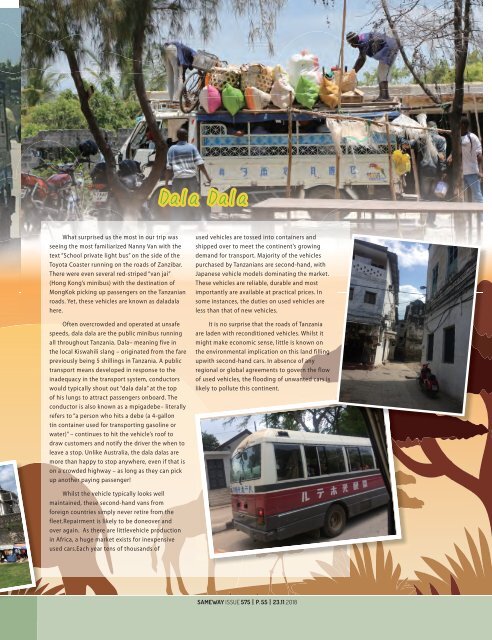Issue 575
You also want an ePaper? Increase the reach of your titles
YUMPU automatically turns print PDFs into web optimized ePapers that Google loves.
What surprised us the most in our trip was<br />
seeing the most familiarized Nanny Van with the<br />
text “School private light bus” on the side of the<br />
Toyota Coaster running on the roads of Zanzibar.<br />
There were even several red-striped “van jai”<br />
(Hong Kong’s minibus) with the destination of<br />
MongKok picking up passengers on the Tanzanian<br />
roads. Yet, these vehicles are known as daladala<br />
here.<br />
Often overcrowded and operated at unsafe<br />
speeds, dala dala are the public minibus running<br />
all throughout Tanzania. Dala– meaning five in<br />
the local Kiswahili slang – originated from the fare<br />
previously being 5 shillings in Tanzania. A public<br />
transport means developed in response to the<br />
inadequacy in the transport system, conductors<br />
would typically shout out “dala dala” at the top<br />
of his lungs to attract passengers onboard. The<br />
conductor is also known as a mpigadebe– literally<br />
refers to “a person who hits a debe (a 4-gallon<br />
tin container used for transporting gasoline or<br />
water)” – continues to hit the vehicle’s roof to<br />
draw customers and notify the driver the when to<br />
leave a stop. Unlike Australia, the dala dalas are<br />
more than happy to stop anywhere, even if that is<br />
on a crowded highway – as long as they can pick<br />
up another paying passenger!<br />
used vehicles are tossed into containers and<br />
shipped over to meet the continent’s growing<br />
demand for transport. Majority of the vehicles<br />
purchased by Tanzanians are second-hand, with<br />
Japanese vehicle models dominating the market.<br />
These vehicles are reliable, durable and most<br />
importantly are available at practical prices. In<br />
some instances, the duties on used vehicles are<br />
less than that of new vehicles.<br />
It is no surprise that the roads of Tanzania<br />
are laden with reconditioned vehicles. Whilst it<br />
might make economic sense, little is known on<br />
the environmental implication on this land filling<br />
upwith second-hand cars. In absence of any<br />
regional or global agreements to govern the flow<br />
of used vehicles, the flooding of unwanted cars is<br />
likely to pollute this continent.<br />
Whilst the vehicle typically looks well<br />
maintained, these second-hand vans from<br />
foreign countries simply never retire from the<br />
fleet.Repairment is likely to be doneover and<br />
over again. As there are littlevehicle production<br />
in Africa, a huge market exists for inexpensive<br />
used cars.Each year tens of thousands of<br />
SAMEWAY ISSUE <strong>575</strong> P. 55 23.11.2018













